- Joined
- Oct 9, 2007
- Messages
- 47,670 (7.43/day)
- Location
- Dublin, Ireland
| System Name | RBMK-1000 |
|---|---|
| Processor | AMD Ryzen 7 5700G |
| Motherboard | Gigabyte B550 AORUS Elite V2 |
| Cooling | DeepCool Gammax L240 V2 |
| Memory | 2x 16GB DDR4-3200 |
| Video Card(s) | Galax RTX 4070 Ti EX |
| Storage | Samsung 990 1TB |
| Display(s) | BenQ 1440p 60 Hz 27-inch |
| Case | Corsair Carbide 100R |
| Audio Device(s) | ASUS SupremeFX S1220A |
| Power Supply | Cooler Master MWE Gold 650W |
| Mouse | ASUS ROG Strix Impact |
| Keyboard | Gamdias Hermes E2 |
| Software | Windows 11 Pro |
Intel's upcoming Core i7-6850K six-core processor made its way to the hands of an enthusiast on OCN, who wasted no time in picturing the chip, and putting it through a few handy tests. Built for the LGA2011v3 socket, the i7-6850K is based on the 14 nm "Broadwell-E" silicon, and features six cores, HyperThreading enabling 12 logical CPUs, 15 MB of L3 cache, and a nominal clock speed of 3.60 GHz. To begin with, while the i7-6850K is pin-compatible with existing socket LGA2011v3 motherboards (and logically features an identical pin-map to "Haswell-E,") the package is slightly different. Its fiberglass substrate is slightly thinner (1.12 mm vs. 1.87 mm of "Haswell-E,"). Its thickness is made up for by a chunkier IHS (integrated heatspreader).
The i7-6850K sample was installed on a machine with ASRock X99 Extreme3 motherboard (BIOS: P3.30), 16 GB of quad-channel DDR4-2133 memory, and a single GeForce GTX 980 Ti graphics card. It was compared to a Core i7-5820K processor on the same setup. The i7-6850K based setup was barely (~1%) faster at 3DMark FireStrike Extreme in its final score, however, its CPU-intensive Physics score was 14.9% higher. Moving on to the community favorite Cinebench R15, the i7-6850K yielded a 10% higher score. To test its single-core performance, the chip was put through SuperPi 32M, where the i7-6850K crunched through the test in 8m 27.854s, compared to 8m 38.866s by the i7-5820K.
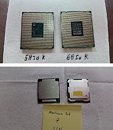
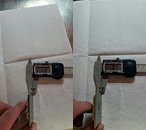
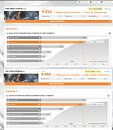
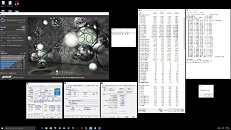
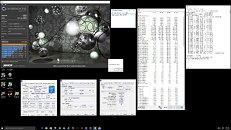
View at TechPowerUp Main Site
The i7-6850K sample was installed on a machine with ASRock X99 Extreme3 motherboard (BIOS: P3.30), 16 GB of quad-channel DDR4-2133 memory, and a single GeForce GTX 980 Ti graphics card. It was compared to a Core i7-5820K processor on the same setup. The i7-6850K based setup was barely (~1%) faster at 3DMark FireStrike Extreme in its final score, however, its CPU-intensive Physics score was 14.9% higher. Moving on to the community favorite Cinebench R15, the i7-6850K yielded a 10% higher score. To test its single-core performance, the chip was put through SuperPi 32M, where the i7-6850K crunched through the test in 8m 27.854s, compared to 8m 38.866s by the i7-5820K.





View at TechPowerUp Main Site





